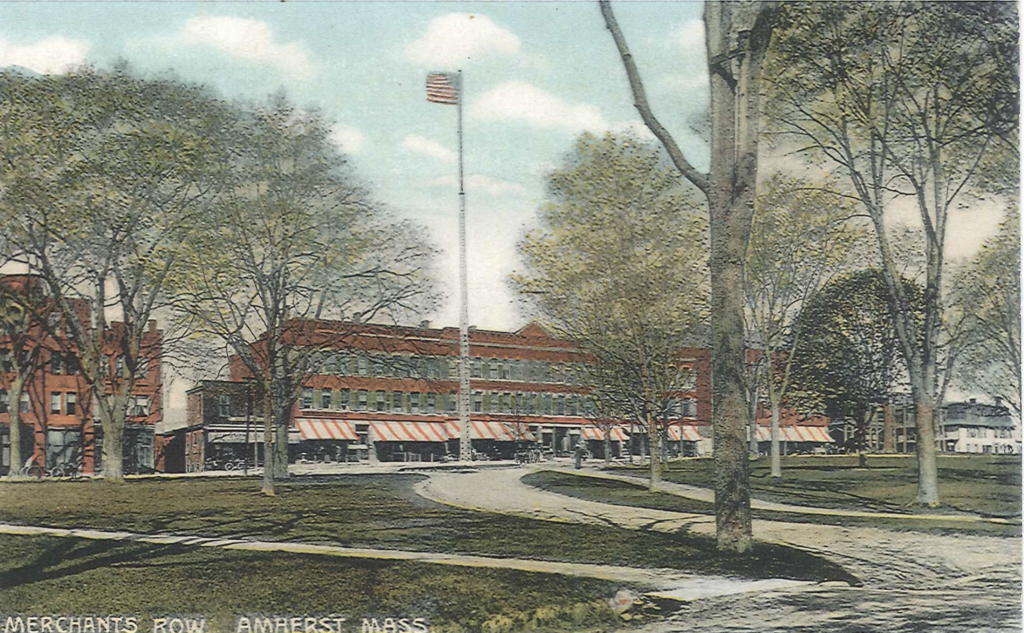Letter: Why Not Sustainable Planning For Downtown?

Photo: amherstma.gov
When I look at the streetscape in downtown Amherst, I do see that there are several buildings that are not the “highest and best use” for the land they’re sitting on.
I would fully support certain of those properties being improved with attractive 3 story buildings, that would coordinate well with the most appealing buildings that are already there.
They would have handsome design, ample setback from the street, be conducive to community members communing, and have a ground floor of interesting and useful retail, restaurants, offices, and other commercial uses. Above that commercial first floor would be reasonably priced residences, a mix of rentals and owner-occupied, students, professionals, retirees, families. By creating well designed dwellings at attainable prices, it would attract the diversity we all claim to want.
Why has this kind of thing not been planned out more? Between the Planning Board, Planning Department, UMass Architecture department, developers, one would think there could be some suggestions of what is our ideal building, that is profitable enough for a developer to be interested.
The math would need to include certain “true costs” including how to provide parking to those residents, in a way that doesn’t strip away short term parking for everyone that would like to visit to eat, shop, and do their business.
In our town there is probably a healthy fan base for 7th Generation toilet paper. We care about the consequences of how we live. So why not design a 7th generation Amherst building, that is not get-rich-quick or likely will not sustain itself, physically or financially, for more than a couple of generations, if that. (side note: 7th Generation toilet paper is the creation of a Hampshire grad!!)
This is a time where developers could rise up as heroes, fulfilling the public need for housing in a civic minded way. Why not?
Ira Bryck
Ira Bryck has lived in Amherst since 1993, ran the Family Business Center for 25 years, hosted the “Western Mass. Business Show” on WHMP for seven years, now coaches business leaders, and is a big fan of Amherst’s downtown.

Thank you Ira for continuing to advocate alternative ideas to meet our unmet need for diverse and affordable housing.
This idea would benefit all of us and help unite our sometimes diverging strategies for addressing our dual need for taxes and housing. Although it makes sense to seek a developer to implement this vision, I worry that step is/will be the roadblock. Rather than look for a profit making individual or entity with some social consciousness, my suggestion has long been (as Ira knows) to look for socially conscious people with some profit making predilection. Perhaps, this is an unconventional idea and may “fly in the face” of assumptions we have about what drives successful businesses. I admit that it is rather ambitious to imagine constructing an enterprise whose primary purpose is to enhance the quality of life in our community and sees profit making as a necessary but secondary goal. Of course, this idea could be forwarded and supported by the help of certain regulatory and zoning initiatives. The first step is to rally the interest and support of community members and governing agencies. Keep in mind that the 14 000 students that live off campus will spend some 200 million dollars ($200 000 000) per year on housing alone. This is an immense untapped resource for our community that is currently going to large investment agencies outside our community or a few local private entities. We need to learn to direct these resources toward the benefit of our community as a whole, shared more broadly than is currently the case. Owner occupancy is a powerful and largely unused regulatory tool to help move us in this direction.
To summarize – we need to move beyond relying on private profit making entities and the beneficence of donors to realize our collective goals for diversity, equity, and inclusion.